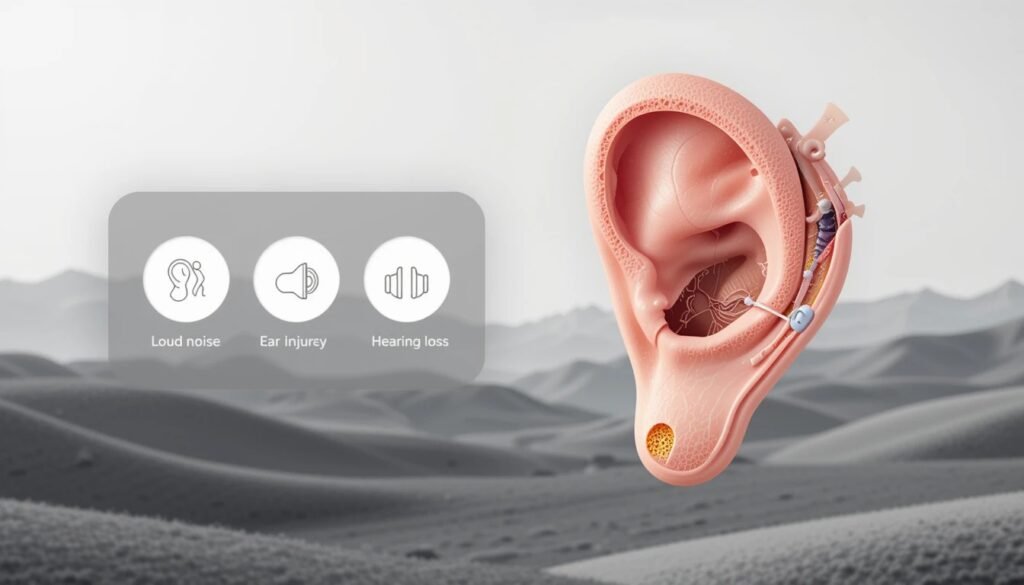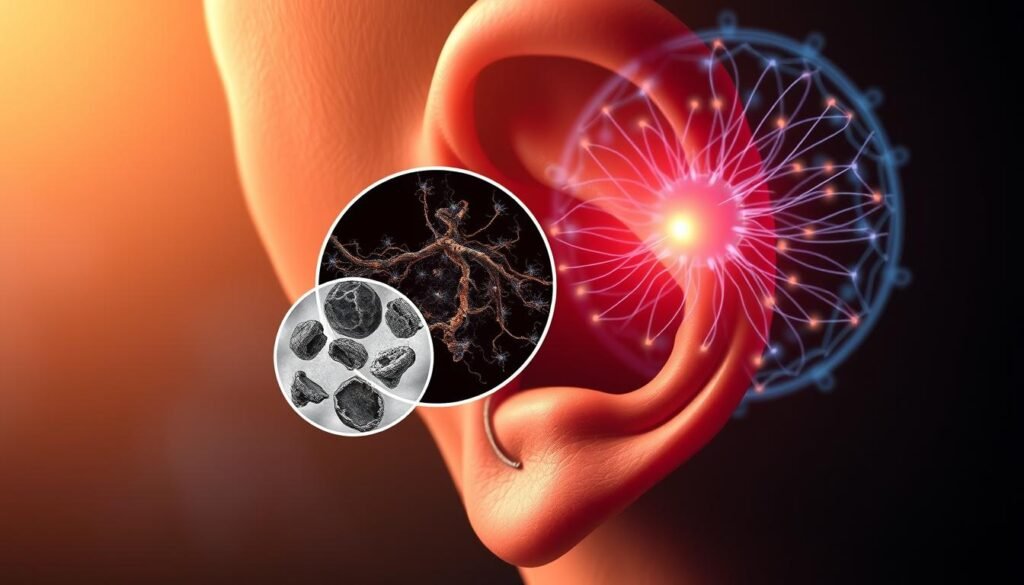
Have you ever experienced a persistent ringing or buzzing in your ears when there’s complete silence around you? This phenomenon, known as tinnitus, is more common than you might think, affecting millions of people worldwide. For me, it started unexpectedly one evening, leaving me restless and searching for answers.
Tinnitus is not just about hearing sounds that aren’t there. It’s a complex condition often linked to hearing loss and changes in how our brains process sound. Imagine living with a constant hum or whistle that no one else can hear—it’s not just annoying; it can be downright debilitating.
While tinnitus doesn’t have a cure, there are ways to manage it. I’ve found personal relief through the Ring Quiet Plus supplement, which has helped me regain peace and clarity in my daily life. But understanding the root causes is just as important as finding treatment options.
In this article, I’ll share my journey with tinnitus, backed by scientific insights and medical research. Together, we’ll explore what causes this condition and how you can find relief, just like I did.

Key Takeaways
- Tinnitus is the perception of noise without an external source, affecting millions globally.
- It is often linked to hearing loss and neural changes in the brain.
- Causes range from exposure to loud noises to certain medications.
- While there’s no cure, treatments like supplements and therapies can provide relief.
- Understanding the root cause is crucial for effective management.
Understanding Tinnitus: Insights from My Experience
At first, I found it hard to describe the sounds in my head to my doctor. It wasn’t just ringing—sometimes it was a high-pitched whistle, other times a deep hum. Tinnitus, as I later learned, is the medical term for this phenomenon where you hear sounds without any external source.
From what I’ve researched and what my doctor explained, tinnitus is closely linked to hearing loss. When the ears struggle to detect sound, the brain tries to fill in the gaps, often creating these phantom noises. In my case, years of loud concerts and noisy environments likely played a big role.
It’s not just about the noise, though. Medication side effects can also trigger tinnitus. I remember starting a new prescription around the time my symptoms began, and my doctor confirmed that it could be a contributing factor.
Understanding how the brain processes sound has been eye-opening. It’s not just your ears that matter—it’s how your brain interprets those signals. This connection explains why some people find relief through sound therapy or cognitive exercises.
Reflecting on my journey, I’ve realized how important it is to address tinnitus early. While it’s manageable for me now, I wish I had known more about the risks of loud noise and hearing protection sooner.
Top 5 Causes of Ear Buzzing (Tinnitus)
Ear buzzing, or tinnitus, can stem from various factors. Understanding these causes is crucial for effective management. Below, we explore the most common triggers and provide insights into their impact.
| Cause | Description | Prevention Tips |
|---|---|---|
| Noise Exposure | Prolonged exposure to loud noises can damage the inner ear, leading to tinnitus. This is common among musicians and construction workers. | Use ear protection in noisy environments and take regular breaks to give your ears a rest. |
| Hearing Loss | Hearing loss often accompanies tinnitus. When the brain struggles to process sounds, it may create phantom noises. | Get regular hearing tests and avoid environments with excessive noise. |
| Medication Side Effects | Certain medications, such as antibiotics and aspirin, can cause tinnitus as a side effect. | Consult your doctor if you notice symptoms after starting a new medication. |
| Ear Blockage or Infection | Earwax buildup or infections can create internal pressure, triggering tinnitus. | Avoid inserting objects into the ear and treat infections promptly. |
| Head and Neck Injuries | Physical trauma to the head or neck can affect the auditory system, leading to tinnitus. | Wear protective gear in risky activities and seek immediate medical attention after injuries. |
Recognizing these causes can help individuals take preventive measures and seek appropriate treatment. If symptoms persist, consulting a healthcare professional is advisable.
Exposure to Loud Noise: My First Trigger for Tinnitus
My journey with tinnitus began in a bustling concert venue, where the loud music was exhilarating but would later prove to be detrimental. The thumping bass and screaming guitars left me with a persistent ringing that didn’t fade even after the music stopped. This was my first encounter with tinnitus, and it was a harsh reminder of the risks associated with loud noise exposure.

Impact of Concerts and Loud Environments
Concerts were a significant part of my social life, but they also exposed me to dangerously high decibel levels. Over time, these loud environments took a toll on my hearing. Research shows that prolonged exposure to sounds above 85 decibels can damage the delicate hair cells in the inner ear, leading to tinnitus and hearing loss. I often found myself in situations where the music was loud enough to cause discomfort, but I didn’t realize the long-term consequences.

The stress of being in such loud environments wasn’t just about the immediate discomfort; it also increased my risk of developing chronic tinnitus. I noticed that after each concert, the ringing in my ears would linger longer than before, a clear sign that my hearing was being affected. This pattern highlighted the cumulative effect of noise exposure over time.
Protective Measures and Sound Awareness
Looking back, I wish I had taken preventive measures more seriously. Simple devices like earplugs could have made a significant difference. There are various types of ear protection available, from disposable foam plugs to custom-molded devices, all designed to reduce sound levels without compromising the music quality.
It’s crucial to recognize the problem early and take proactive steps to protect your hearing. Over time, repeated exposure can lead to irreversible damage, making it essential to address the issue promptly. By understanding the risks and taking the right precautions, you can enjoy loud environments while safeguarding your hearing health.
Hearing Loss and Other Medical Conditions Linked to Tinnitus
As I delved deeper into my tinnitus journey, I discovered how closely it’s tied to other health issues. Age-related hearing loss, in particular, plays a significant role. According to scientific studies, the prevalence of tinnitus is highest among individuals between the ages of 40 and 70. This connection highlights how aging naturally contributes to hearing loss, increasing susceptibility to tinnitus.

Influence of Aging and Genetic Factors
As we age, the delicate hair cells in the inner ear begin to deteriorate, a condition known as presbycusis. This deterioration can lead to hearing loss and, subsequently, tinnitus. Genetic factors also come into play, as some people may be more predisposed to age-related hearing issues. Understanding this link can help in early identification and management of tinnitus symptoms.
Other Health Concerns: High Blood Pressure and More
High blood pressure is another significant factor that can exacerbate tinnitus. Research indicates that managing high blood pressure can significantly reduce the severity of tinnitus symptoms. Additionally, other cardiovascular issues and certain diseases can affect blood flow to the ears and brain, worsening tinnitus. For instance, conditions like Meniere’s disease often present with vertigo and hearing loss alongside tinnitus.

It’s crucial to recognize that a ringing ear might be a symptom of broader health conditions. Proper management of these underlying issues can lead to improved overall well-being. By addressing high blood pressure and other cardiovascular factors, individuals can alleviate tinnitus symptoms and enhance their quality of life.
Exploring Treatments: From Sound Therapy to Ring Quiet Plus Supplement
While there’s no definitive cure for tinnitus, various treatments can help manage its symptoms. I’ve explored several options, and what works best often involves a combination of approaches.
Sound Masking and Behavioral Strategies
Sound therapy has been a game-changer for me. It works by masking the internal sounds, helping my brain ignore the ringing. White noise machines or apps with calming sounds like rain can create a constant, soothing background that drowns out the tinnitus. I’ve also tried cognitive behavioral therapy (CBT), which helped me change how I react to the noise, reducing its impact on my daily life.
Behavioral strategies, such as mindfulness and relaxation exercises, have also been beneficial. These practices help manage the stress and anxiety that can worsen tinnitus symptoms. By staying calm and centered, I’ve found it easier to cope with the constant noise.
How Ring Quiet Plus Supplement Enhances Relief
After trying several treatments, I discovered the Ring Quiet Plus supplement. It’s specifically designed to target the root causes of tinnitus, like nerve damage and poor blood circulation. The supplement contains natural ingredients that support nerve health and reduce inflammation, which has made a noticeable difference in my symptoms.
Since starting Ring Quiet Plus, I’ve experienced fewer episodes of intense ringing. It’s not a magic solution, but it’s definitely helped me regain control over my life. I feel more confident in social situations and enjoy a better quality of life without the constant distraction of tinnitus.
Combining the supplement with sound therapy and stress management has provided the most relief. It’s important to find a treatment plan that works for you and consult with a healthcare professional to tailor it to your needs.

Lifestyle Adjustments and My Path to Wellness
My journey toward managing tinnitus has been deeply influenced by the lifestyle changes I’ve adopted. These adjustments have not only reduced the intensity of my symptoms but also improved my overall well-being.
Stress Management and Relaxation Techniques
Stress is a known trigger for tinnitus, and I’ve found that managing it is crucial. I’ve incorporated relaxation techniques such as meditation and deep breathing exercises into my daily routine. These practices have helped lower my internal pressure and created a calmer environment for my mind and body.
| Technique | How It Helps | Frequency |
|---|---|---|
| Meditation | Reduces stress and mental fatigue, alleviating tinnitus symptoms | Daily, 10-15 minutes |
| Deep Breathing | Lowers overall stress levels and promotes relaxation | Multiple times a day |
| Yoga | Improves blood circulation and reduces muscle tension | 3 times a week |
Dietary Considerations and Avoiding Triggers
Diet plays a significant role in managing tinnitus. I’ve made conscious choices to avoid high-sodium foods, as they can exacerbate symptoms, especially in those with conditions like Ménière’s disease. I also limit my intake of caffeine and alcohol, which can act as triggers.
Staying hydrated is essential, as dehydration can intensify tinnitus. I ensure I drink plenty of water throughout the day and avoid sugary drinks that can contribute to high blood pressure.
By maintaining a consistent daily routine that includes a balanced diet and regular exercise, I’ve noticed a significant improvement in my ability to hear and a reduction in triggering factors. These small yet impactful changes have shaped my approach to wellness and continue to support my journey toward better hearing health.

Conclusion
My journey with tinnitus has taught me the importance of understanding its complex causes and seeking effective solutions. Through personal experience and research, I’ve identified key triggers such as prolonged noise exposure, hearing loss, and certain medications. These factors often intertwine, making tinnitus a multifaceted condition that requires a comprehensive approach.
One of the most impactful steps I’ve taken is incorporating the Ring Quiet Plus supplement into my routine. By addressing nerve health and blood circulation, it has significantly reduced my symptoms, offering a sense of relief I thought was unattainable. However, I’ve also learned that no single solution works for everyone, which is why consulting a healthcare professional is crucial, especially when addressing vessel-related issues in the auditory pathway.
Reflecting on my experience, I encourage others to explore various treatment options and lifestyle adjustments. Protecting your hearing through measures like earplugs and maintaining a balanced diet can make a substantial difference. Remember, while tinnitus is challenging, knowledge and proactive care can pave the way to a healthier, more peaceful life.
FAQ
What is tinnitus, and how does it affect hearing?
Tinnitus is a condition where you hear ringing, buzzing, or other sounds in your ears when no external noise is present. It can affect your ability to concentrate and enjoy quiet environments but does not directly cause hearing loss. However, it can be a symptom of underlying hearing problems.
Can tinnitus be caused by loud noise exposure?
Yes, prolonged exposure to loud noise, such as at concerts or in noisy work environments, is a common cause of tinnitus. This is because loud sounds can damage the delicate hair cells in your inner ear, leading to ringing or other sounds in your ears.
How does hearing loss relate to tinnitus?
Hearing loss and tinnitus often occur together. When the hair cells in your inner ear are damaged, your brain may struggle to process sound properly, which can result in both hearing difficulties and the perception of ringing or buzzing in your ears.
What role does high blood pressure play in tinnitus?
High blood pressure can contribute to tinnitus by affecting blood flow to the ears and brain. Poor circulation may exacerbate symptoms, making the ringing or buzzing more noticeable. Managing blood pressure through lifestyle changes or medication may help reduce tinnitus severity.
Can stress and anxiety trigger tinnitus?
Yes, stress and anxiety can worsen tinnitus symptoms. When you’re under stress, your body’s “fight or flight” response can make you more aware of the internal sounds in your ears, making the condition more noticeable and bothersome.
Are there effective treatments for tinnitus?
While there is no cure for tinnitus, several treatments can help manage symptoms. These include sound therapy, cognitive behavioral therapy, and in some cases, medications or supplements like Ring Quiet Plus to alleviate discomfort and improve quality of life.
How can I protect my hearing to prevent tinnitus?
Protecting your hearing involves avoiding prolonged exposure to loud noises, using ear protection in noisy environments, and getting regular hearing tests. These steps can help reduce the risk of developing tinnitus and hearing loss.
Can tinnitus be a symptom of other health conditions?
Yes, tinnitus can be a symptom of various health issues, including ear infections, head injuries, or circulatory problems. If you experience persistent or severe symptoms, it’s important to consult a doctor to rule out underlying conditions that may need medical attention.
How long does tinnitus typically last?
Tinnitus can be temporary or chronic, depending on the cause. For example, short-term exposure to loud noise may cause ringing that lasts a few days, while underlying conditions like hearing loss or nerve damage may lead to long-term symptoms.
Can children experience tinnitus?
Yes, children can experience tinnitus, often due to ear infections, exposure to loud noises, or other medical conditions. If your child reports ringing or buzzing in their ears, it’s important to seek professional evaluation to address any underlying issues.
Source Links
- What Is Tinnitus? — Causes and Treatment – https://www.nidcd.nih.gov/health/tinnitus
- The Basics of Tinnitus – https://www.webmd.com/a-to-z-guides/understanding-tinnitus-basics
- Understanding and Managing Tinnitus: My Insights from a Recent WTOP Interview | Hearing Doctors – https://hearingaiddoctors.com/patient-resources/understanding-and-managing-tinnitus-my-insights-from-a-recent-wtop-interview
- The Ringing Reality: 5 Leading-Edge Insights into the Causes of Tinnitus You Shouldn’t Ignore – https://www.lescentresmasliah.com/en/the-ringing-reality-5-leading-edge-insights-into-the-causes-of-tinnitus-you-shouldnt-ignore/
- Pathophysiology and Treatment of Tinnitus: An Elusive Disease – https://pmc.ncbi.nlm.nih.gov/articles/PMC3918281/
- 12 Possible Causes of Ringing in Ears, Dizziness, Pressure in Head – https://www.healthline.com/health/ringing-in-ears-dizziness-pressure-in-head
- Patient education: Tinnitus (ringing in the ears) (Beyond the Basics) – https://www.uptodate.com/contents/tinnitus-ringing-in-the-ears-beyond-the-basics/print
- Tinnitus (ringing in the ears): Causes and treatments – https://www.medicalnewstoday.com/articles/156286
- Tinnitus – Symptoms and causes – https://www.mayoclinic.org/diseases-conditions/tinnitus/symptoms-causes/syc-20350156
- What Causes Tinnitus? – Sound Relief Tinnitus & Hearing Center – https://www.soundrelief.com/what-causes-tinnitus/
- Tinnitus: One Possible Reason Your Ears Won’t Stop Ringing – https://www.uhhospitals.org/blog/articles/2021/03/tinnitus-one-possible-reason-your-ears-wont-stop-ringing
- Diagnostic Approach to Tinnitus – https://www.aafp.org/pubs/afp/issues/2004/0101/p120.html
- Hearing loss – Symptoms and causes – https://www.mayoclinic.org/diseases-conditions/hearing-loss/symptoms-causes/syc-20373072
- Tinnitus – https://www.healthdirect.gov.au/tinnitus
- Tinnitus: Remedies to Treat Ringing in Your Ears – https://www.healthline.com/health/tinnitus-remedies
- Tinnitus Supplements: Success, Cautions, and Other Treatments – https://www.healthline.com/health/nutrition/tinnitus-supplements
- Why You Have Tinnitus – https://www.webmd.com/a-to-z-guides/tinnitus-triggers
- All About Tinnitus (Ringing in the Ears) – https://www.healthline.com/health/tinnitus
- Tinnitus – StatPearls – NCBI Bookshelf – https://www.ncbi.nlm.nih.gov/books/NBK430809/
- Tinnitus: Characteristics, Causes, Mechanisms, and Treatments – https://pmc.ncbi.nlm.nih.gov/articles/PMC2686891/